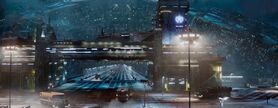Science fiction films do not conform to science is the most normal thing in the world. People are originally science fiction and movies, not science.
So the question is, what has been done with these unscientific points.
The film "Wandering Earth" only intercepts a fragment of the background of the original novel and creates a new story. The use of scientific elements is very different from the original. The scientific part of the movie is entirely for the plot. What kind of tempo the plot needs, what kind of disasters and solutions are provided (analogous to interstellar crossing), not because these disasters and solutions have inherent scientific logic and physical processes (Analogous to The Martian).
To be honest, this usage can't satisfy my personal desire, but it is indeed the correct usage as a whole. It takes a long time for an original book like The Martian to appear, and its scientific logic can only be fully appreciated by a few moviegoers. Following this route, the use of science in the "Wandering Earth" movie is actually successful.
Success does not mean nothing wrong. I think the movies and the original works of Wandering Earth have a common problem: they are not good at hiding clumsiness.
In the universe described in Robert Sawyer's "God in Computing", intelligent life did not evolve by itself according to the principle of natural selection, but was guided step by step by a super alien intelligence. That is a universe where intelligent design theory comes true. But the story still takes place in today's reality. The protagonist of the story is just an ordinary paleontologist, and the evidence in reality does not support the theory of intelligent design. In other words, the main premise of this novel is unscientific.
But the whole novel is still based on today's reality, not a parallel history nor a distant future. How to do it? The author arranged for an alien to arrive on the earth, let her argue with the protagonist, and tell the evidence supporting the theory of intelligent design from her mouth. (In particular, the aliens in the novel use more advanced physics and mathematics to falsify the multiverse hypothesis, pointing out that all the universes that have existed together do not exceed a dozen; they also discovered that the number of universes in our universe is extremely high. There are so many intelligent lives, which proves that our universe does allow wisdom extraordinary.)
In other words, the author packs up all the "unscientific" things as "more advanced science".
This approach seems cheap and lazy to say, but it is precisely the shortcoming of many creators. Some authors don’t know enough about the relevant science to realize how important the scientific elements they violated are; some authors care about preserving a sense of reality, but science is not part of their sense of reality; some authors are reluctant to include non-scientific content out of self-esteem Wrap it with the unknown, and must give an explanation forcibly. For various reasons, the anti-scientific elements in a work have not been concealed, and it appears abrupt and unconventional.
Let's take a look at a few examples.
The key elements in "2001: Space Odyssey", whether it is Black Slate or Star Gate, are completely mysterious. As a result, it has become the most memorable scene in the entire film and even the entire film history. There is no explanation, there is no need for explanation, and there will not be many viewers who want to use the existing science to explain-they clearly put themselves at the farthest end of the unknown. Science recognizes and even welcomes the unknown! It's just that science has a general judgment about what is unknown. Both forced explanation and forced refusal to explain are not scientific.
The black hole scene of "Interstellar Crossing" must have been affected by 2001, but the plot needs to be unable to be lost to the unknown, so I had to come up with a five-dimensional creature as an explanation. This is not scientific, but fortunately, we really don't know what a black hole should look like, and high-dimensional creatures do whatever they want in the sci-fi tradition, so it's still a foolish pass.
The whole film of "The Martian" is quite scientific, but the opening is a big mistake: Although the Martian dust storm has high wind speed and frequent, but because the Martian atmosphere is too thin, the physical lethality is far inferior to that of the storm on the earth. There is no way, there must be an opening disaster to make the plot run, and it is the author's last resort. (In fact, there is an alternative disaster that can be used. The Martian sandstorm will bring corona discharges, which once destroyed a Soviet probe. The author later said that he had known this and used it at that time.) Fortunately, the Martian sandstorm is terrible. This matter has been rendered by science fiction for many years, so it's not a violation.
The opening disaster of the novel "The Wandering Earth" is a bit strange. Helium flash is a phase that does occur in the life of the sun: low-mass stars cannot perform helium fusion normally, only at the end of their lives, some residual helium will be pressed together and burned briefly and violently. However, the helium flash only occurs when the hydrogen in the core of the star is about to burn out. At this time, the star has been red giant for a long time (for the sun, it is about 1.2 billion years after leaving the main sequence). If the earth is still in its original state. If it were on the track, it would have long been unlivable. This is completely different from the sudden eruption of the normal sun in the novel. The sun's mass is not enough to become a supernova, and there is no double star for it to absorb mass, so the author probably first decided to force the earth to leave according to the supernova treatment, and then chose the most supernova phase in the life cycle of the sun and forced it forward. To start the plot.
The advantage of this method is that almost no one knows about helium flash, and its principle sounds decent. The downside... In addition to dissatisfying people who understand astrophysics, it's actually a bit obtrusive to the general audience. Why did the good sun suddenly explode? Lack of foreshadowing at the plot level.
In the "Wandering Earth" movie, the disaster that really kicked off the plot was that the earth was about to hit Jupiter because of Jupiter's "gravitational surge."
Wait, what?
There are two variables that determine gravity, one mass and one distance. Where does gravity come from?
In fact, it is not difficult to conceal this problem. Jupiter is a fluid, and uneven internal mass distribution can indeed cause gravitational anomalies. Under normal circumstances, the degree of this anomaly is less than one in ten thousand, but it can be set that the arrival of the earth happens to interfere with an important flow route in a critical state within Jupiter, just as a small change in climate can affect the North Atlantic warm current and bring about significant consequences.
But this kind of cover-up is useless for me, it depends on the film to show itself. Not only did I see no explanation in the movie, but even the sequence of scientists discovering anomalies-expressing surprise-tracing the cause was not given. The computer announced that Jupiter's gravitational force had increased sharply and the earth was about to hit it. Coincidentally, the earth's surface was affected by a large-scale disaster at the same time, so everyone was busy with disaster relief, and no one asked why.
This disaster really promoted the plot very well, but it served the plot too thoroughly, ignoring that the disaster itself should also have an operating logic.
If the story is told according to a more standard routine, it may be that everyone decides to use Jupiter as a gravitational slingshot. A scientist pointed out that we have never used something as big as the earth to make projectiles, which may cause abnormal fluid characteristics of Jupiter and be rejected by others. As the Earth approaches Jupiter, signs of bad things begin to appear, but when the real real hammer evidence arrives, everyone finds that it is too late, so they have to find a way to remedy it, and so on. Of course, this story deviates from the theme of the film. I can understand that the director chose not to elaborate on it, but to throw out an anti-scientific opening catastrophe so casually as a fait accompli. feel.
Similar questions run through the entire movie. In terms of scientificity, most sci-fi blockbusters are no better than Wandering Earth; the reason why their final results are better or worse than Wandering Earth is not the science itself, but whether they are packaged at least in line with common sense in the film. The interstellar flood stars and ice stars are already in chaos, and the Babel library in the black hole unfolds indiscriminately, but it worked very hard to pave the way for these scenes; the point that Prometheus was ridiculed was not the engineer’s. The behavior is scientifically unreasonable, but the entire ship’s astronauts are stupid. They just take off their helmets in the aliens. They are not vigilant when they see alien life. They don’t send people on night shifts. If accidents happen, they don’t notify everyone. Of course, they see big The wheels rolled over and didn't know how to hide to the side.
Ignoring the scientific logic of the disaster itself will eventually lead to contradictions in the plot. The pre-calculated orbit is invalid due to the surge of gravity, which proves that gravity itself is unpredictable. Since the most important variables have become unknown, why would anyone believe in AI's next orbit calculation? Although Jupiter's gravity has increased sharply, the apparent gravity on the surface has not shown a significant change. No one has walked out of the moon or even Mars. Why would such a small change in gravity cause the engine to stall and the city to blackout? If the engine is such a sensitive thing, why not put a few more flints on the side for backup? The higher the flame spray of the engine means that the working fluid is faster and the propulsion is more efficient, so why not use it in normal times? This time rewriting the program requires manual pushing of the firing pin. Then who pushed the firing pin last time? Only high temperature is needed to ignite the hydrogen-oxygen mixture. Why can't the engine throw a high-temperature object in the past? These are not unresolvable contradictions, but the film focuses on the advancement of the plot itself, and does not leave any effort to resolve or at least conceal them.
I admit that this is very likely to be nitpicking. There are too many factors that need to be taken into account in a movie. There may be many points that the director and screenwriter have considered but have to give up due to other reasons. So I still agree that the use of scientific elements by Wandering Earth is generally successful. This is a good science fiction movie.
But it can always be better, right?
————————————————————————
Attached is the unfolding method of scientific contradiction in this film that I arbitrarily imagined. I know that this is because it’s not painful to speak while standing. It is completely possible to turn into a bad film according to this shooting, so it is only for entertainment and reference:
Background: The orbit of Barnard’s star has been disturbed by anomalous disturbances, and it begins to approach the solar system at a higher speed, threatening to disrupt the orbits of all planets.
Countermeasures: planetary engine, the earth passes Jupiter for gravitational slingshot + Oberst maneuver (turn on the engine with full force at the place closest to Jupiter, because the fuel efficiency is the highest in the depth of the gravitational well).
Opening catastrophe: Because of the underestimation of the complexity of Jupiter's internal fluid, the arrival of the Earth caused a major change in the mass distribution of Jupiter, causing the engine to suffer huge tidal forces, and the engine was running at full load and the safety margin was not high, leading to failure and flameout.
McGoffin: The experimental primer fuel is not used for re-ignition but with stronger injection efficiency to survive the disaster (because it is experimental, it is small in quantity and requires long-distance transportation).
Disaster on the way: In addition to the ice, you can consider adding more crustal activities (after all, the engine should have put a lot of stress on the crust, and the impact of sudden flameout must be greater).
Moral conflict: stronger engine injection will cause geological disasters. You can put a city on a nearby fault zone and say that the city may be sacrificed (in fact, it may not be sacrificed, and a supporting role can be arranged to escape in the city) .
Climax: Jupiter ignites the plan, but plays the dual role of pushing the earth and changing Jupiter's ocean currents. (Well, the idea of burning Jupiter is very unscientific. Hydrogen and oxygen are actually unlikely to be fully mixed, and the energy is not enough, but I do like it very much)
Sacrifice: The space station self-destructs, but a little more emphasis on the importance of preserving the earth on a practical level (this decision is important, and it seems a little emotional in the movie...)
Ending: bleak blue spot, but this time the small spot is the sun (such a good stem does not need to be white)
View more about The Wandering Earth reviews









